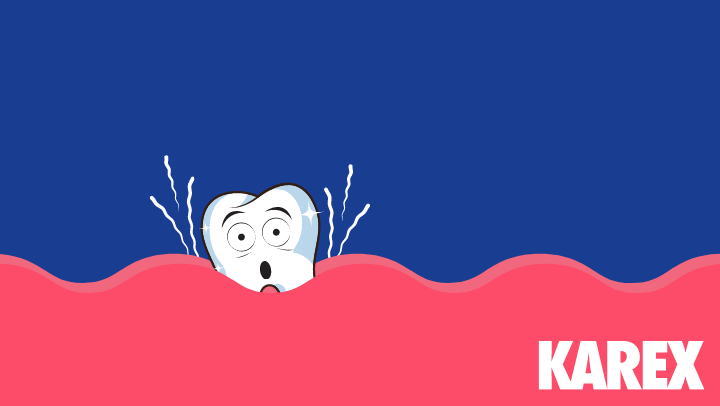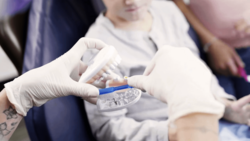Tooth accident in children – what to do
What parents need to do if a tooth is loose, broken or knocked out

Tooth accidents can happen so quickly when children are playing, running around or doing sports: after a fall, a tooth becomes wobbly, is displaced, broken off or has even been knocked out. Find out here what you should do in the event of tooth accidents or dental trauma to save your child’s tooth and what measures are otherwise important.
First aid for tooth accidents
When an accident happens, it is a big shock. First calm your child down and check the mouth for injuries. To stop any bleeding, apply a clean tissue or sterile bandage to the wound; a cold cloth cools the area down.
The next steps depend on whether a whole tooth has been knocked out, a piece has broken off or a tooth is loose. It is important to react quickly as teeth can dry out within a few minutes if they are not cared for correctly. If this happens, they can no longer be saved.
Tips for tooth accidents: Saving the tooth
Storing the teeth until you and your child arrive at the dentist is crucial:
- Both teeth and broken-off pieces of tooth are best stored in cold UHT milk (max. one to two hours), a plastic bag or a freezer bag (30 minutes) or a container with saliva (30 minutes).
- An even better solution is a tooth rescue box from the pharmacy. It prevents the tooth from drying out and keeps the cells in the periodontium alive for around 24 hours.
- Do not clean or disinfect the tooth.
If you carry out the steps described above, you have already taken the first step to saving the tooth. It is important to go to the dentist, preferably within the first hour following the accident. If the knocked-out tooth or the piece of tooth is in good condition, there is a good chance that the dentist can help. Chipped pieces of tooth can often be glued back on and a knocked-out tooth can be reinserted.
Knocked-out tooth – what to do

- Hold the tooth by the crown, not the root.
- Do not clean the tooth.
- Transport the tooth in UHT milk, a clean plastic film or in a tooth rescue box.
Tooth loose or wobbly – what to do

- Do not touch the tooth
- Take care when biting down on it, do not play around with it, do not eat anything.
Tooth broken off – what to do

- Wrap the broken-off piece of tooth in a clean plastic film or place it in a container with UHT milk or saliva. Alternatively, store it in a tooth rescue box.
- Do not clean or disinfect the piece of tooth.
It is essential with all types of tooth accidents to go to the dentist or the emergency dental services on the same day to have the tooth or wound examined.
Do not underestimate accidents involving milk teeth
“Oh well, it would have fallen out soon anyway, we don’t need to do anything.” Wrong: Injuries to milk teeth should always be checked by a dentist, regardless of whether the tooth is loose, is displaced, is broken off or knocked out.
The main priority is not to preserve the milk tooth, but, first and foremost, to ensure that the tooth buds of the permanent teeth are not damaged. It should also be checked whether there are any injuries to the soft tissue or the jaw bones that have to be treated.
Unlike permanent teeth, knocked-out milk teeth are not reinserted in order to prevent damage to the permanent tooth buds.
If teeth have moved, it is essential to go to the dentist on the same day: Once the healing process begins, it may not be possible to move the tooth back to the original position.
What to do in the case of a tooth accident after visiting the dentist
Even after visiting the dentist, you should take another few steps so that the tooth accident does not lead to any unpleasant consequences later on:
- Inform your insurance company: It is best to report tooth accidents, even those that appear harmless, to your insurance company. This means you are on the safe side if any problems occur in the future.
- Proper care after the accident: To avoid inflammation, ensure that your child practices good oral hygiene in the weeks after the accident and help your child to clean their teeth.




![[Translate to en_DE:] Karies bei Kindern und Babys [Translate to en_DE:] Karies bei Kindern und Babys](/fileadmin/_processed_/7/6/csm_karex-menu-teaser-karies-bei-kindern_ff35a65787.jpg)
![[Translate to en_DE:] Zahnputztechnik [Translate to en_DE:] Zahnputztechnik](/fileadmin/_processed_/c/4/csm_karex-menu-zahnputztechnik_0eee9a9a83.jpg)